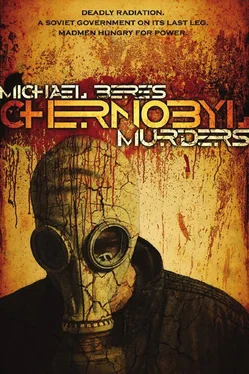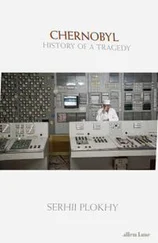Michael Beres - Chernobyl Murders
Здесь есть возможность читать онлайн «Michael Beres - Chernobyl Murders» весь текст электронной книги совершенно бесплатно (целиком полную версию без сокращений). В некоторых случаях можно слушать аудио, скачать через торрент в формате fb2 и присутствует краткое содержание. Жанр: Триллер, на английском языке. Описание произведения, (предисловие) а так же отзывы посетителей доступны на портале библиотеки ЛибКат.
- Название:Chernobyl Murders
- Автор:
- Жанр:
- Год:неизвестен
- ISBN:нет данных
- Рейтинг книги:4 / 5. Голосов: 1
-
Избранное:Добавить в избранное
- Отзывы:
-
Ваша оценка:
- 80
- 1
- 2
- 3
- 4
- 5
Chernobyl Murders: краткое содержание, описание и аннотация
Предлагаем к чтению аннотацию, описание, краткое содержание или предисловие (зависит от того, что написал сам автор книги «Chernobyl Murders»). Если вы не нашли необходимую информацию о книге — напишите в комментариях, мы постараемся отыскать её.
Chernobyl Murders — читать онлайн бесплатно полную книгу (весь текст) целиком
Ниже представлен текст книги, разбитый по страницам. Система сохранения места последней прочитанной страницы, позволяет с удобством читать онлайн бесплатно книгу «Chernobyl Murders», без необходимости каждый раз заново искать на чём Вы остановились. Поставьте закладку, и сможете в любой момент перейти на страницу, на которой закончили чтение.
Интервал:
Закладка:
Already four weeks after the Chernobyl accident, yet news from Radio Moscow seemed like the confessions of a naughty boy caught in the devious act. The boy would be silent, acting as if nothing had happened. Then, when someone pointed out the obvious, the boy would confess in a way that would implicate others. The spooning out of information caused anger in cities and lively meetings on collectives. Farmers wanted to help their fellow farmers in need, but they also wanted to be told the truth about the danger and the outlook for the future.
At a collective farm three hundred kilometers southwest of Kiev, an evening meeting was held in the living room of the chairman. The collective was small and far enough from Chernobyl so no Chernobylites had yet been sent there. The meeting had been called to tell collective committee members that the Agriculture Ministry had designated seven families be permanently relocated there.
The committee argued about where the people would stay and who would build them houses. They argued about what jobs the new members would perform and whether one of them should be allowed on the committee. They argued about the small size of their school. One man on the committee wondered if the new members could bring radiation with them. A woman on the committee spoke against this, saying whatever harmful radiation the people received was locked in their bodies and would affect only them.
“The Chernobylites might have it in their clothing,” said the man.
“These people are checked by technicians,” said the woman. “If their clothes are radioactive, they get new ones. And quit calling them Chernobylites.”
The man waved his hand at the woman. “If technicians told you the reactor never really blew up, I suppose you’d believe them.”
“You’re talking nonsense,” said the woman.
“Ha! We might not be safe from radiation even here.”
“How can you say that? Kiev is much closer. Kievians aren’t dying.”
“Not dying,” said the man. “But they sent all their children to the Black Sea. I spoke with my cousin in Kiev. He said they have special milk only for children, and Kiev is building an aqueduct to bring fresh water into the city. One cannot escape radiation. In a year or two, we’ll all be dying of cancer.”
It was the woman’s turn to wave her hand at the man. “You’re a fool. How can you say such a thing? We have no radiation here!
And you’re a fool for talking about such things to your cousin in Kiev on the telephone!”
The man paused a moment and smiled to everyone on the committee before speaking. “If I’m such a fool, why did I see technicians at the pond today?”
“What pond?”
The man continued to smile. “We have only one pond on the farm, the very same pond where your favorite pigs are taken to drink.”
The woman pretended to spit. “I have no favorite pigs, not even you!”
The chairman stood and asked for order. He told the man to tell about the technicians at the pond and to refrain from sarcasm.
“Very well,” said the man. “I was on my way past the pond with a can of oil for our tractor, which burns more oil than gas, when I saw a car parked and a man and woman picnicking on a blanket.
They looked like doctors, both wearing white coats. I said hello and thought I might get some advice about my arthritis. They said they weren’t doctors but technicians checking for radiation. I asked if they found any. They said no.”
“I told you,” said the woman.
“But wait,” said the man. “When I walked past their car, I managed a peek inside and saw a carrying case saying it contained dangerous radioactive samples.”
“Ha,” said the woman. “A carrying case talks to him.”
“It didn’t talk. Words were printed on it.”
“What words?”
“It said, danger, radioactive samples, in Russian. If they were carrying radioactive samples, they must have gotten them from here.”
“They probably carry the case around in case they find radioactive samples,” said the woman, looking to others for support.
“Besides, you know very little Russian.”
“So, tell me why they left the car to eat.” Now the man looked to the others. “I’ll tell you why. Because it’s not good to eat around radiation. It gets inside and eats you from the inside out. It turns your cells against you. It’s the worst cancer there is. And I know plenty of Russian.”
“Describe these technicians,” said the chairman.
“They weren’t Ukrainian. I could tell by their accents. They could have been Russian or even Czech or Hungarian. Maybe Belarussian.”
“Why Belarussian?” asked the chairman.
The man thought for a moment before answering. “Reports said radiation was very high in the Belarussian Republic to the north.
Perhaps the technicians camped out here were on their way south to escape with samples from their own area. Technicians would know best about the cancer danger and would want to go south.”
The mention of cancer and the description of technicians who might be fleeing Chernobyl radiation silenced the meeting, reinforcing the inevitability of damage already done. Many who would be affected by future disease were already impregnated. Except for having children drink potassium iodide the first few days after the accident, there was nothing anyone could do but pray their own cells would be strong enough to stave off the attack from within.
As far as the Chernobylite refugees were concerned, the committee members began seriously discussing where to house them and what jobs they could do on the farm.
Juli lay back on the pile of straw, aware of the warmth stored in the barn from the day’s sun, and of its smells-livestock, leather, straw, and fresh paint. She looked up at the rafters, saw bird droppings on timbers darkened with age. One rafter was worn thinner at its center where a rope must have been tied, or many ropes wearing the wood away over decades. She wondered what the ropes had been for. She wondered if a rope tied to the rafter had ever been used to hang someone. They were in the Carpathian foothills, the Skoda having coughed and sputtered its way. The Czech and Hungarian frontiers were nearer, just across the northern range. They were already within the region of border disputes and turmoil, which took place during the last war. Perhaps the rafter above had been used for hanging dissenters. And now abandoned, with no other task, the barn awaited future hangings.
“Do you think we’ll make it?” asked Juli.
Lazlo was in the center of the barn, putting the finishing touches on the car with a brush and a can of oily black paint he had found.
“We’ll make it. If anyone tries to catch us, they’ll stick to our fly-paper.”
“Isn’t it drying?”
Lazlo dabbed at the roof. “Slowly. The part you did is only sticky now, not wet.”
“Our little Skoda with a brand-new skin.”
While Lazlo continued painting, Juli shook out the blankets they had taken from the Kopelovo collective and arranged them on the bed of straw near the stone wall at the back of the barn. Last night they had slept in the car. Tonight would be more comfortable. After the blankets were spread out, she stuffed straw beneath the bottom blanket at the end nearest the wall to form a wide pillow.
When she finished making their bed, she took off her slacks and blouse and got under the top blankets. Lazlo was stooped behind the car and hadn’t seen her undress. The lantern was aimed at the car, and their bed was in the dark corner against the wall.
Although the barn was in good condition, it seemed unused.
Lazlo said it might be used to house livestock in the winter. It was some distance from the collective village and was probably left over from a time when one family owned the farm. Near the barn there was an overgrown foundation, which might have been a house before one of the wars.
Читать дальшеИнтервал:
Закладка:
Похожие книги на «Chernobyl Murders»
Представляем Вашему вниманию похожие книги на «Chernobyl Murders» списком для выбора. Мы отобрали схожую по названию и смыслу литературу в надежде предоставить читателям больше вариантов отыскать новые, интересные, ещё непрочитанные произведения.
Обсуждение, отзывы о книге «Chernobyl Murders» и просто собственные мнения читателей. Оставьте ваши комментарии, напишите, что Вы думаете о произведении, его смысле или главных героях. Укажите что конкретно понравилось, а что нет, и почему Вы так считаете.












